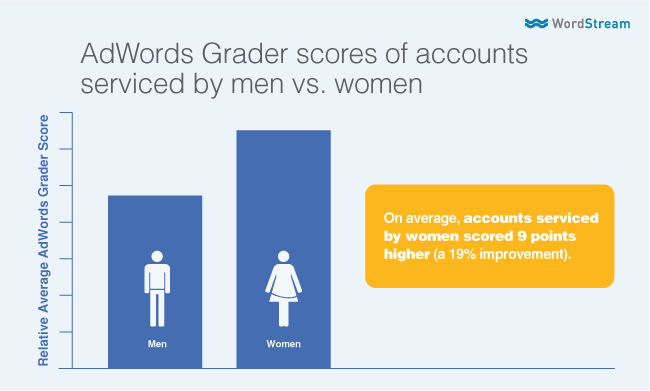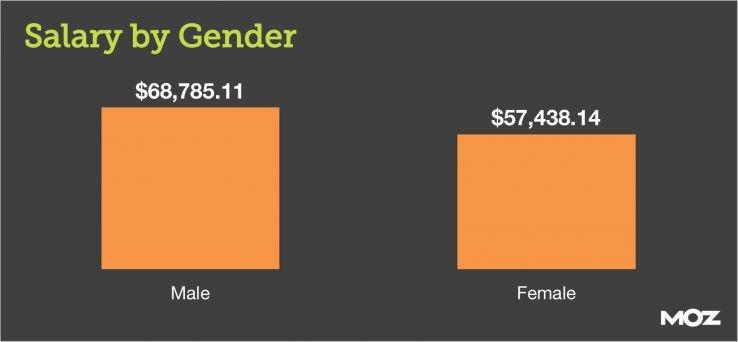
Does the internet marketing industry have a gender bias problem? It’s something that’s been talked about before, but too often, those discussions are based almost entirely on speculation, a general sense that women are getting the short end of the stick. And the problem with speculation is that it’s easy to dismiss.
Moz’s recent industry salary survey provided some interesting data; they found that women in online marketing are paid less than their male counterparts, even at the same levels of education and experience. This sparked some really great discussion, but again, some may assume men just get the better jobs because of greater ability, better performance, or more ambition. But is this really the case?
I recently ran across some internal data that really surprised me. I believe it proves that gender bias in our industry is not only real, but measurable. Let’s take a look at the data and talk about what it means and what we can do about it.
Measuring Gender Bias In the Search Marketing Industry
At WordStream, we’re always analyzing data to figure out how to do better. We regularly conduct a 90-day customer satisfaction survey. One of the questions on this survey is, rate your satisfaction level with your client service representative, on a scale of 1-4 (4 = Excellent, 1= Poor).
Last month, we reviewed the responses from all clients who completed the survey in 2014 so far. Then we segmented the data by the customer service representative to get a sense of who our top performing reps are. Here’s what the data looked like (I’ve removed the names of the customer service reps):
I was totally blown away by the results. The mean satisfaction score across all reps, for this time slice and segment of clients, was 3.11. Almost all the men had scores above this group average, and all the women had scores below the group average. Further, the male client service rep with the lowest score still did better on the survey than the female client service rep with the higest score. What the heck?! There’s no interspersion of males and females in the ranking order – all the men came out on top, followed by all the women.
Spider sense tingling. This can’t be right. I would expect to see a mix of some men and women client service reps with scores above the mean, as well as a mix below the mean.
I suspected gender bias at play here. Either that, or all men are better search marketing client sevice managers than women – which seemed a bit dubious. But how to prove it?
Are Men Better Search Marketers than Women?
This is search marketing. Unlike a lot of fields, we can quantify pretty much everything. If men truly are better than women at search engine marketing, then you would expect the accounts that are co-managed/supported by our male client service reps to be doing way better than those being co-managed by the female reps. (Our reps don’t fully manage these accounts, they just provide support and recommendations. It’s up to the owners to do most of the work.)
But how do you measure the success of an AdWords account? That’s when the light bulb went on. We just so happen to have this thing called the AdWords Grader. (Apologies in advance for plugging our own tool here; I promise that’s not what this post is about, it just made it easier for us to analyze the data.) The Grader is a free tool that benchmarks the health/achievement of your AdWords account in a comprehensive way. It analyzes dozens of objective metrics in your account, like click-through rates, conversion rates, Quality Scores, account activity, and use of best practices like conversion tracking and negative keywords. It then benchmarks your level of achievement versus other companies in the same industry as you, with similar budgets (so little guys don’t have to compete with big guys). You then get a percentile score, corresponding to your ranking within your peer group (i.e., a score of 47% means you are beating 47% of other advertisers who are in your industry and are of similar size, and conversely 53% of those advertisers are doing better than you). It’s a lot like Zillow, where you can compare prices for houses in a particular neighborhood and with similar characteristics – the comparisons are valid because you’re comparing like to like.
My idea was to run our AdWords Grader against all of the client accounts from the survey, then figure out if those supported by men fared any better than those supported by women. Since the Grader evaluates accounts consistently and objectively, I knew we wouldn’t be taking either the rep or the account owner at their word on how good the account was doing.
News Flash: Women Are Actually Better at SEM than Men [Data]
We analyzed the AdWords Grader scores of all the accounts for customers who took part in the survey, then split up the accounts supported by men vs. those supported by women. Here’s what that data ended up looking like:
The AdWords accounts supported by women at WordStream received Grader scores that were on average, 9 points higher than those managed by men! That’s right, the software accounts supported by our female reps had a higher overall AdWords performance score than those supported by male reps. (It is, of course, ultimately up to the clients to do the work.) But despite the fact that their clients had slightly better quantitative results, the women still scored lower on subjective customer satisfaction.
Of course, this doesn’t actually mean that women are inherently better than men at managing paid search accounts, but it may mean they have to work harder just to be seen as equals, or even almost as good.
The Worst Gender Discrimination Happens in the Middle
As we were gathering the account performance data, I was surprised by some of the disparity I was seeing.
For example, take a look at this account. It’s doing amazing!
- Average Quality Score of 7.7/10!
- Account average CTR of 13.3%
- Tons of account activity in last 30 and 90 days!
- Insanely great ads and landing pages!
It scores a 99%. That means that out of 100 accounts, in the same industry and within the similar spend range (in this case approximately $2.7k/month), this account is in the 99% percentile. Seems pretty excellent to me, but this account is co-managed/supported by a woman client service rep, who got just a 3/4 customer satisfaction rating.
That’s just an outlier though. When we looked at all the data together, an uglier picture emerged.
For this part of the analysis, I enlisted the help of our resident data scientist, Mark Irvine, who helped explain what was happening.
Mark broke up our clients into quintiles (i.e., five buckets of equal size, based on their AdWords Grader scores) – and this revealed two alarming findings:
First, female account reps received lower scores then male client service reps regardless of the customer’s level of achievement. There’s essentially no winning for the women here.
Second, and more concerning, is that the gap in male and female client service rep score in the middle and 2nd quintiles is almost a full point! Despite those few early outliers, clients at the very top and the very bottom have, on average, predictably good or bad ratings for their rep, and the difference between genders isn’t as bad. However, for this middle tier of clients – clients whose performance is average or slightly below the average in this pool – the scores are uniquely bipolar. These clients give male client service reps their highest ratings, while giving female client service reps their worst ratings.
My take on this phenomenon is that discrimination in our field is of the subtle, pernicious variety – there’s no overt sign on the door that says women need not apply – that would be too obvious. Rather, the strongest bias occurred in the “average performing accounts” in our pool of advertisers (i.e. accounts that were neither failing badly, nor succeeding wildly). For these “average performing” accounts, it would seem that that men client service managers more often than not, receive the benefit of the doubt where as women client service managers are far less likely to get a pass.
Women May Be More Susceptible to Gender Bias than Men
We also wanted to know if both male and female clients were impacted by the gender bias we were seeing, or if this was a case of just men putting down women. We can do this kind of analysis, because we know the gender of the client doing the rating. Again, the results were shocking.
The gender bias was actually more dramatic among female clients, who scored female reps by an average of .82 points lower than they would male reps (compared to .43 lower score by male clients). Is it possible female clients are even more demanding of female search marketing reps?
It’s also worth noting that the male client service reps scored considerably higher with their female clients.
Client Service Rep Tenure Doesn’t Matter
Mark took a look to see if there could be other signals at play here which could explain the gender bias we were seeing. The most obvious thing was to look at was the experience level of the client service representative at WordStream.
For example, what if the women client service reps were less experienced than the male client service reps, in terms of number of months on the job – could that explain their lower scores? Here’s what Mark found:
The research clearly showed that men were favored over women across all levels of experience and seniority. In other words, seniority had no effect on the scores, and experience doesn’t explain the discrepancy in scores.
The 21% Gender Valuation Gap: How Much Are Women Undervalued?
Based on our analysis, we believe there’s a 21% gender worth gap in the search marketing industry – in other words, women are, on average, viewed as 21% less valuable than their male peers, regardless of experience and other performance metrics.
Getting dinged on a customer satisfaction score is just one example of how this Gender Valuation Gap might play out. I could see this bias having effects in many other areas. For example a 21% handicap might give the man the edge in terms of:
- Getting a job interview
- Being hired for the job
- Getting the raise and/or promotion
- Getting accepted or being invited to speak at a search marketing conference
And so on and so on. Over time, it compounds and adds up to a lot more men at the top and in high-visibility roles in our industry, even if they started with the same level of ability.
It’s also worth noting that the 21% Gender Valuation Gap aligns remarkably well with the 19.7% average gender pay gap that Moz identified in their recent search industry survey:
Are female search marketers actually worth less, or is an underlying sexism affecting their perceived value by the rest of the industry? Our research points to the latter.
How Does Gender Bias Affect Morale?
We asked our female client service reps the following questions to get a sense of how this bias might affect them, if they were conscious of it at all:
- The data shows that men get higher customer satisfaction scores across the board than women, though men are not delivering better results than women. (In fact, the accounts supported by women had better results.) Why do you think that is?
- Were you surprised by your score? How did it make you feel? Does it affect your ability to do your job well?
- Have you ever felt that you were discriminated against because of your gender? Can you name an example?
- Do you notice any difference in how your male and female clients treat you?
- We suspect that gender bias is a pervasive problem in search marketing. How do you think we can address these issues?
I was a little surprised that some of the women on our Customer Success team seemed quick to blame themselves. For example, in response to Question 1, one said:
Often women tend to be more gentle, speak in higher pitched voices, and may not always exude confidence the way a male does. By nature men have deeper pitched voices which I believe leads them to sound more confident, and women sometimes need to work on this. I’m constantly working on my tone and trying to shift towards more definitive language.
The same issue was echoed by another woman on staff:
I think this has a lot to do with the way that men carry themselves and a varying sense of confidence (or perceived confidence) between men and women. The perception is sometimes that men know more simply because they sound more confident … I think men in general are better at just telling people what they want to hear rather than working with them in a more sympathetic manner.
Both women note that men often sound more confident than women – it’s unclear if they actually are more confident. But this may just be a stereotype with no basis in reality. Another rep told me:
I’ve had numerous situations where clients have asked for a second opinion on the advice that I’ve given them. When this happens, I always ask [redacted] or [redacted] to get on the phone and make the exact same recommendation that I’ve been making. Usually, they are quick to accept it coming from a guy.
So this rep is completely confident in her opinions – her clients just want to hear them coming from a man’s mouth. Since women are born with different vocal cords, it’s hardly fair to judge their confidence levels or the authority of their advice based on the pitch of their voice. It’s probably not that deep voices naturally sound more authoritative, but that we’re all biased toward men, so we’ve learned to “read” deep voices as more trustworthy. (In other words, if men had higher voices, we’d trust higher voices more.)
I know some readers will question whether it’s possible that our male reps are just easier to work with than our female reps, regardless of the performance they’re delivering. But this bias comes before the clients have even met the reps. One rep told us, in response the question “Have you ever felt that you were discriminated against because of your gender?”:
100% yes—by both female and male clients. I’ve actually had cases in which new clients unabashedly have requested new reps specifically because they feel more comfortable working with a male strategist.
In more heartening news, everyone agreed that “awareness is key” and studies like this are a great first step to fixing the problem. One rep said, “Continuing to educate people on gender bias in the workplace will bring attention to the fact that gender bias IS still indeed a problem that needs to be addressed.” Another said, “Once people start to acknowledge that there is a problem, they will be more cognizant of making non-biased decisions (one would hope…).”
Another:
I think the only real way to address gender bias in any industry is to keep talking about it and keep proving that women are just as capable of excelling in paid search. Case studies, data, valuable information all coming from women is only going to further prove that there should not be any separation between reps of different genders. It’s certainly not something that will be fixed overnight, but as women continue to see success and high performance it will help to make people more aware of what’s going on. Similarly, highlighting women and showing their success will probably give us more confidence, which seems to be a huge factor in how others perceive us.
Nobody said they were deeply disturbed or offended by the data. The fact that most everyone took the valuation gap in stride may explain why it’s so persistent – it’s subtle enough for most people to ignore. Or, as Kristen Yerardi, our VP of Customer Success, pointed out, maybe it’s just so commonplace cross-industry that women learn how to deal with it as a matter of course. She said:
In 2014, the American Enterprise Institute studied White House salaries. The median annual salary for women in the White House was $65k, while the same for men was $73.7k. That’s a 13% difference in salary. Whether you like Obama or not, he’s vocal about fixing this issue. Even a President who want to help is starting out with a gap so large, he seemingly can’t overcome it. How can any corporation or government agency close that gap realistically?
What Can We Do To Fix the Gender Bias Issue?
I don’t really know. It’s a complicated issue. The way I look at it, as a founder of an internet marketing company, you can approach the problem from the top down or from the bottom up of your organization.
Can we do better when it comes to hiring? Look at your internet marketing staff – is it 50/50 men/women or way out of balance, more like 80/20? If it’s the latter, you should probably do something about that. As my colleague Elisa Gabbert recently said, “If you’re in a hiring role, examine the hiring process – do you tend to screen out more women? Could you be judging their resumes more harshly? Could your job descriptions even reveal a bias, which might dissuade women from applying?” Addressing these issues could help even the numbers out of the gates. This isn’t “affirmative action” – you don’t need to hire women who are worse at the job than men. What we need to do is question whether we’re overvaluing men that aren’t truly more qualified.
Can industry leaders nurture women within their companies? The 21% Gender Valuation Gap means that men will on average, catch more “lucky breaks” within their career than women. This becomes huge if you keep compounding it over time. So, one of my personal goals is to spend time working with the female staff to help them land a few opportunities of their own. For example, perhaps it could be helping review pitches to land more prominent external-facing gigs. The numbers show they’re doing as well or better than their male colleagues when it comes to managing campaigns, so I’m not suggesting that we need to “save” them or do their work for them. But if gender bias is real, it means we probably (as men) already have an advantage, and we can use it to promote women in our companies. (Or maybe we just need to make sure we’re not standing in their way?)
I’m not saying I’m above any of these problems, and I’m not suggesting others aren’t doing enough either. I’m also not suggesting that our clients have done something wrong. Quite the opposite. I think we’re all complicit here. It’s a systemic problem that manifests in many different subtle, often unconscious ways.
But the first step toward changing things is recognizing there’s a problem, so I wanted to share the data that we discovered in a transparent way. You can draw your own conclusions, but I urge you not to brush them off as flawed or inconsequential. For me, the key takeaway here is that gender bias in search is real and that it impacts us all. I’ve always suspected that this was the case, but didn’t have concrete evidence on how it impacts our collective psyche until now.
Acknowledgements
Thanks to my colleague Elisa and many others in the industry, including Jen Lopez, Lisa Barone, and Megan Williams to name a few, for writing about the issues of gender bias and discrimination in online marketing. Had they not called these issues to my attention repeatedly, I would have never even known to investigate it. Also thanks to Mark Irvine for all the deep data analysis work, Miranda Miller for the input, and Kristen Yerardi for her support in exploring this topic.












